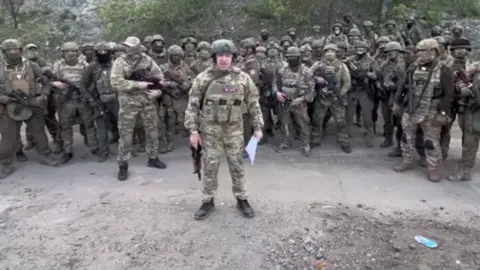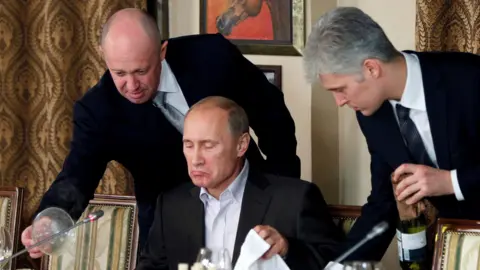Yevgeny Prigozhin: Wagner Group boss says he will pull fighters out of Bakhmut
 Concord Press Service
Concord Press ServiceThe leader of Russia's Wagner mercenary group says he will withdraw his troops from the Ukrainian city of Bakhmut on 10 May because of ammunition shortages.
Yevgeny Prigozhin's statement came after he posted a video of him walking among his dead fighters' bodies, blaming top Russian defence officials.
"Tens of thousands" had been killed and injured there, Prigozhin said.
Russia has been trying to capture the eastern city for months, despite its questionable strategic value.
Wagner troops have been heavily involved.
Earlier this week, US National Security Council spokesman John Kirby - citing newly declassified intelligence - said that more than 20,000 Russian soldiers have been killed and another 80,000 wounded in fighting in Ukraine since December. Half of the dead were from the Wagner group.
In his statement on Friday, Prigozhin, 61, pinned his decision to withdraw from Bakhmut squarely on the defence ministry, using expletives.
"Shoigu! Gerasimov! Where is the... ammunition?... They came here as volunteers and die for you to fatten yourselves in your mahogany offices."
Defence Minister Sergei Shoigu and Chief of the General Staff Valery Gerasimov have often been the focus for Prigozhin's anger, amid reports of fierce infighting among different power groups in Russian President Vladimir Putin's entourage.
In the statement, Prigozhin said his Wagner's casualties were "growing in geometrical progression every day" because of the lack of ammunition.
But he stressed that his fighters would stay on their positions until 9 May, when Russia marks Victory Day in World War Two, and would only withdraw from Bakhmut the following day.
In the video released earlier, Prigozhin - seen standing in front of his men - said he would "transfer positions in the settlement of Bakhmut to units of the defence ministry and withdraw the remains of Wagner to logistics camps to lick our wounds".
"My lads will not suffer useless and unjustified losses in Bakhmut without ammunition," he added.
One of the videos released by Prigozhin on Friday appears to have been filmed about 2km (1.2 miles) from the centre of Bakhmut. The BBC has matched ground features, including bushes and pylons, with satellite imagery of the location.
 Reuters
ReutersPrigozhin is a publicity seeker, and his influence has seemingly waned in recent months. He has previously made threats he has not followed through with - subsequently dismissing them as jokes and military humour.
Only last week he told a Russian pro-war blogger that Wagner fighters in Bakhmut were down to their last days of supplies of bullets, and needed thousands of rounds of ammunition.
The Kremlin has not commented on Prigozhin's latest statements.
Meanwhile, Ukraine's military said it was not seeing any decline in the intensity of fighting near Bakhmut.
"For months, Prigozhin has been trying to make outrageous statements in order to draw attention to himself," Serhiy Cherevatyi, a spokesman for Ukraine's Eastern Command, has told BBC Ukrainian.
And Ukraine's deputy Defence Minister Hanna Malyar said Russia was desperately trying to seize Bakhmut by 9 May.
Prigozhin has emerged as a key player in Russia's full-scale invasion of Ukraine launched in February 2022, in charge of a private army of mercenaries leading the Russian onslaught.
He recruited thousands of convicted criminals from jail for his group - no matter how grave their crimes - as long as they agreed to fight for Wagner in Ukraine.
Prigozhin hails from St Petersburg, Russian President Vladimir Putin's home city. The two most likely first met at one of Prigozhin's restaurants in the city. Years later, Prigozhin's catering company Concord was contracted to supply food to the Kremlin, earning him the nickname "Putin's chef".
The battle for Bakhmut has dragged on for months. Wagner troops and regular Russian forces have fought on the same side, against the Ukrainian military.
Ukraine decided to defend the city at all costs in an apparent attempt to focus Russian military resources on one place of relatively little significance.
In February, Prigozhin posted another image of his dead troops and blamed army chiefs for their deaths.
Although the military denied deliberately starving his Wagner group of shells, at the time they did respond by increasing supplies to the front line.
US-based military analyst Rob Lee argues that Wagner's latest complaint of shortages likely reflects Russia's defence ministry rationing ammunition ahead of Ukraine's long anticipated counter-offensive.
The ministry has to defend the whole front, but Prigozhin's sole concern lies in taking Bakhmut, he wrote on Twitter. If Wagner did manage to take the city Prigozhin could claim the political credit, Mr Lee added.
The mercenary chief has himself predicted that Ukraine's counter-offensive will begin by 15 May, as tanks and artillery will be able to advance in dry weather, after the last spring rain.

In a separate move, Prigozhin appears to have hired an army general who was recently dismissed as logistics chief.
Col-Gen Mikhail Mizintsev was dubbed the "butcher of Mariupol" for his role in last year's bombardment of Ukraine's southern port city, captured by Russian forces a year ago.
Prigozhin has pointed out that the general had done his best to help supply mercenaries with ammunition and had co-operated with the group's efforts to recruit convicted prisoners to its ranks.
Col-Gen Mizintsev was only put in charge of army logistics last September, shortly after Prigozhin was filmed inside a Russian prison telling inmates they would be freed from jail if they served with his men in Ukraine.
